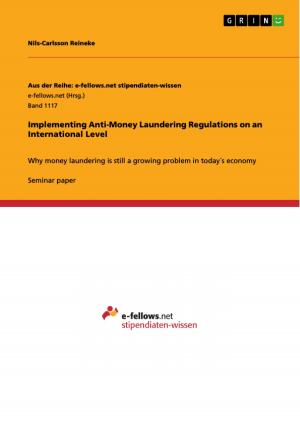Impact of Globalization on Rural Development
Nonfiction, Social & Cultural Studies, Political Science| Author: | Md. Mizanur Rahman | ISBN: | 9783656379744 |
| Publisher: | GRIN Verlag | Publication: | February 28, 2013 |
| Imprint: | GRIN Verlag | Language: | English |
| Author: | Md. Mizanur Rahman |
| ISBN: | 9783656379744 |
| Publisher: | GRIN Verlag |
| Publication: | February 28, 2013 |
| Imprint: | GRIN Verlag |
| Language: | English |
Research Paper (undergraduate) from the year 2013 in the subject Politics - International Politics - Topic: Globalization, Political Economics, Thammasat University, Bangkok (National Institute of Development Administration(NIDA), Bangkok, Thailand ), language: English, abstract: In a globalized world the dynamics of rural development in Bangladesh has changed immensely. Globalization, free trade and privatization have brought about many positive and negative impacts on rural development. This article tries to focus on three major impacts of globalization on rural development such as impact on environment, poverty and women. In responding to the research questions that how globalization affected environmental degradation, what impact it has done on poverty reduction and women in Bangladesh, the author used a combination of both quantitative and qualitative methods. From the content analysis it was observed that globalization has seriously affected environment such as land degradation; deforestation; soil erosion; soil fertility loss; water logging; salinity and toxification of soils; damage and destruction of coral reefs, mangroves, fisheries; loss of bio-diversity and ecosystem; pollution of air and water bodies etc. that caused huge environmental disasters in Bangladesh. The research findings relating to impact of globalization on poverty reduction unearthed the fact that due to huge remittance from the expatriate foreign labours, exponential increases of agricultural growth especially in cereal crops and increase in labour cost have contributed to reduction of rural poverty in Bangladesh. The increase of agricultural growth was the end result of massive privatization of agricultural sector in Bangladesh that in fact helped the rich farmers to adopt HYV and modern agricultural practices, agrochemicals, pesticides, fertilizers; and privatization also helped them availing of low cost tube wells and agricultural inputs, increase of irrigation facilities. But the poor farmers were hardly affected by the privatization strategy. But the negative scenario in case of poverty is that globalization has increased income inequality in Bangladesh. Lastly, from both content analysis and case studies, it was found that globalization has created employment opportunities of women in the garments industries (RMG) in the export processing zones of Bangladesh. Mostly these women are the poverty stricken women who migrated to city areas from rural areas for employment but the foreign investors are exploited these women by providing a low salary and employed them excessive hours for ensuring their optimum production. [...]
Dr. Rahman works (Joint Director, Research) in the Bangladesh Academy for Rural Development (BARD). Mr. Rahman has 20 years experience in social research, training and action research in broader areas of rural development, local governance and policy issues etc. BARD is mandated to conduct exploratory and operational research, policy analysis; impart training programs to the GOs and NGOs officials & others concerned with rural development. Mizan has published widely in some international and national journals i.e. Sociology Mind, International Journal of Physical and Social Sciences, Asia-Pacific Journal of Rural Development, NIDA Development Journal, Thai Journal of Public Administration, Afro-Asian Journal of Rural Development, Bangladesh Journal of Public Administration, Bangladesh Institute International and Strategic Studies Journal, Journal of Rural Development, The Journal of Rural Development (BARD), Bangladesh Journal of Public Administration etc. He has experience in designing and managing training programs for national and international level participants. Mr. Mizan also holds positions in academic/professional bodies.
Research Paper (undergraduate) from the year 2013 in the subject Politics - International Politics - Topic: Globalization, Political Economics, Thammasat University, Bangkok (National Institute of Development Administration(NIDA), Bangkok, Thailand ), language: English, abstract: In a globalized world the dynamics of rural development in Bangladesh has changed immensely. Globalization, free trade and privatization have brought about many positive and negative impacts on rural development. This article tries to focus on three major impacts of globalization on rural development such as impact on environment, poverty and women. In responding to the research questions that how globalization affected environmental degradation, what impact it has done on poverty reduction and women in Bangladesh, the author used a combination of both quantitative and qualitative methods. From the content analysis it was observed that globalization has seriously affected environment such as land degradation; deforestation; soil erosion; soil fertility loss; water logging; salinity and toxification of soils; damage and destruction of coral reefs, mangroves, fisheries; loss of bio-diversity and ecosystem; pollution of air and water bodies etc. that caused huge environmental disasters in Bangladesh. The research findings relating to impact of globalization on poverty reduction unearthed the fact that due to huge remittance from the expatriate foreign labours, exponential increases of agricultural growth especially in cereal crops and increase in labour cost have contributed to reduction of rural poverty in Bangladesh. The increase of agricultural growth was the end result of massive privatization of agricultural sector in Bangladesh that in fact helped the rich farmers to adopt HYV and modern agricultural practices, agrochemicals, pesticides, fertilizers; and privatization also helped them availing of low cost tube wells and agricultural inputs, increase of irrigation facilities. But the poor farmers were hardly affected by the privatization strategy. But the negative scenario in case of poverty is that globalization has increased income inequality in Bangladesh. Lastly, from both content analysis and case studies, it was found that globalization has created employment opportunities of women in the garments industries (RMG) in the export processing zones of Bangladesh. Mostly these women are the poverty stricken women who migrated to city areas from rural areas for employment but the foreign investors are exploited these women by providing a low salary and employed them excessive hours for ensuring their optimum production. [...]
Dr. Rahman works (Joint Director, Research) in the Bangladesh Academy for Rural Development (BARD). Mr. Rahman has 20 years experience in social research, training and action research in broader areas of rural development, local governance and policy issues etc. BARD is mandated to conduct exploratory and operational research, policy analysis; impart training programs to the GOs and NGOs officials & others concerned with rural development. Mizan has published widely in some international and national journals i.e. Sociology Mind, International Journal of Physical and Social Sciences, Asia-Pacific Journal of Rural Development, NIDA Development Journal, Thai Journal of Public Administration, Afro-Asian Journal of Rural Development, Bangladesh Journal of Public Administration, Bangladesh Institute International and Strategic Studies Journal, Journal of Rural Development, The Journal of Rural Development (BARD), Bangladesh Journal of Public Administration etc. He has experience in designing and managing training programs for national and international level participants. Mr. Mizan also holds positions in academic/professional bodies.















